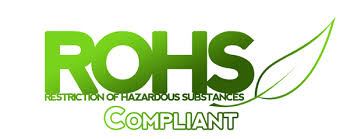RoHS Restricted Substances
RoHS stands for Restriction of Hazardous Substances, and impacts the entire electronics industry and many electrical products as well. The original RoHS, also known as Directive 2002/95/EC, originated in the European Union in 2002 and restricts the use of six hazardous materials found in electrical and electronic products. All applicable products in the EU market since July 1, 2006 must pass RoHS compliance.
Directive 2011/65/EU was published in 2011 by the EU, which is known as RoHS-Recast or RoHS 2. RoHS 2 includes a CE-marking directive, with RoHS compliance now being required for CE marking of products. RoHS 2 also added Categories 7, 8 and 9, and has additional compliance record keeping requirements.
On 4 June 2015, the EU commission has published a new Directive (EU) 2015/863 to amend AnnexII to EU RoHS 2 (Directive 2011/65/EU) to add category 10 on to the list of restricted substances.
Lead (Pb): < 1000 ppm
Lead is commonly used in the electrical and electronics industry in solder, lead-acid batteries, electronic components, cable sheathing and in the glass of cathode-ray tubes.
Mercury (Hg): < 100 ppm
Mercury is widely used metals in the production of electrical and electronic appliances and is concentrated in batteries, switches and thermostats, and fluorescent lamps.
Cadmium (Cd): < 100 ppm
Cadmium is used in electronic equipment, car batteries, and pigments.
Hexavalent Chromium (Cr VI) < 1000 ppm
While some forms of chromium are non-toxic, Chromium VI can produce toxic effects.
Polybrominated Biphenyls (PBB): 1000 ppm
These are flame retardants found in electronic and electrical appliances. They have been found in indoor dust and air through evaporation from plastics.
Polybrominated Diphenyl Ethers (PBDE): < 1000 ppm
These are also flame retardants found in electronic and electrical appliances. Combustion of printed wiring boards release toxic emissions.
Bis(2-Ethylhexyl) phthalate (DEHP): < 1000 ppm
These are used to soften PVC and vinyl insulation on electrical wires.
Benzyl butyl phthalate (BBP): < 1000 ppm
These are used to soften PVC and vinyl insulation on electrical wires.
Dibutyl phthalate (DBP): < 1000 ppm
These are used to soften PVC and vinyl insulation on electrical wires.
Diisobutyl phthalate (DIBP): < 1000 ppm
These are used to soften PVC and vinyl insulation on electrical wires.

